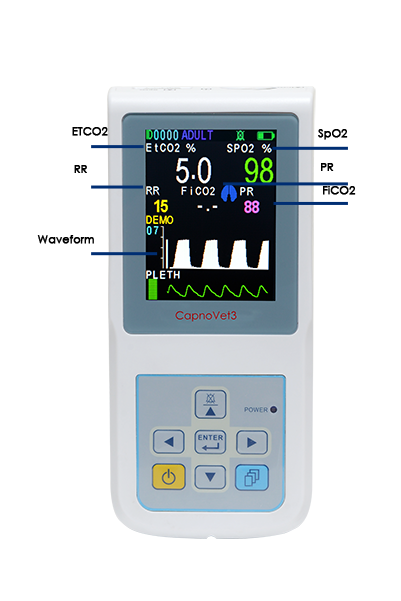Pet-specific capnography monitors are widely used in veterinary clinical and pet care. It can be used for anesthesia monitoring during pet surgery, respiratory status monitoring during postoperative recovery, and management of chronic respiratory diseases.
The device is optimized for pets of different species and sizes, ensuring measurement accuracy and comfort.
Equipped with advanced sensor technology to provide fast and reliable carbon dioxide monitoring.
The design is simple and easy for veterinarians and pet caregivers to use, reducing learning costs.
The equipment is sturdy and durable and can be used for a long time in a variety of environments to meet daily and emergency monitoring needs.
Provide real-time respiratory waveform and carbon dioxide concentration data to help make timely diagnosis and treatment decisions.

| AC Input | 100V - 240V, 50Hz/60 Hz to 5VDC Adapter with 5V type-CUSB adapter Cable. Optional Vehicle 12V to 5V Type-CUSB Charger Lead. |
| Battery | Built-in rechargeable lithium battery pack (3.7V, 3500mAH) |
| Temperature | 5 to +40 ℃ |
| Humidity | 30-75% |
| Atmospheric pressure | 86~106kpa |
| EtCO2/FiCO2 Range | 0~150mmHg |
| Accuracy | ±2mmHg for CO2 range 0 - 40mmHg; ±5% for CO2 range from 41 - 70mmHg; ±8% for CO2 range from 71 - 100mmHg; Over 100mmHg ±10% |
| Respiration Rate Range | 3~150 breaths/minute |
| Accuracy | ±1% of reading or ±1 rpm whichever is greater |
| Size | 72 x 155 x 40mm (W x H x D) |
| Weight | Weight on Airway ETT/LMA<25g. Monitor 380g |
| Display size | 2.8 inches |
Anesthesia Monitoring During Surgery:
During pet surgeries, precise management of anesthesia is crucial for ensuring the success of the procedure and the safety
of the pet. An end-tidal CO2 monitor can provide real-time monitoring of the pet's CO2 levels, helping veterinarians assess
ventilation status and the effectiveness of anesthesia. If CO2 levels rise or fall abnormally, veterinarians can promptly adjust
the anesthesia dosage to keep the pet in a safe anesthetic state.
Postoperative Recovery Monitoring:
The postoperative recovery period is critical for pets after anesthesia. An end-tidal CO2 monitor can continuously track the
pet's respiratory status, offering real-time respiratory waveforms and CO2 level data. By monitoring respiratory function,
veterinarians can quickly identify and address potential complications such as respiratory depression or hypoventilation,
enhancing the safety of postoperative recovery.
Management of Chronic Respiratory Diseases:
For pets with chronic respiratory diseases like asthma or chronic bronchitis, an end-tidal CO2 monitor helps veterinarians
and pet owners continuously monitor respiratory function. Regular recording and analysis of CO2 levels and respiratory
waveforms allow veterinarians to better assess disease progression and treatment efficacy, and adjust treatment plans promptly.
Emergency Care and Intensive Monitoring:
In emergency and intensive care settings, a pet-specific end-tidal CO2 monitor provides quick respiratory function
information. For emergencies such as respiratory failure or choking, the monitor helps veterinarians rapidly assess the
pet's respiratory condition and take effective emergency measures, potentially saving the pet's life.
Routine Checkups and Health Monitoring:
During routine checkups, an end-tidal CO2 monitor can be used to assess the overall health status of pets.
By measuring and recording respiratory data, veterinarians can detect potential respiratory issues early and
recommend further examination or treatment.
Rehabilitation Training and Exercise Evaluation:
For pets undergoing rehabilitation training or exercise evaluation, an end-tidal CO2 monitor helps assess changes
in respiratory function during activity and recovery. By monitoring CO2 levels and respiratory waveforms, veterinarians
and pet rehabilitation specialists can develop personalized rehabilitation plans, ensuring that pets train within safe limits.